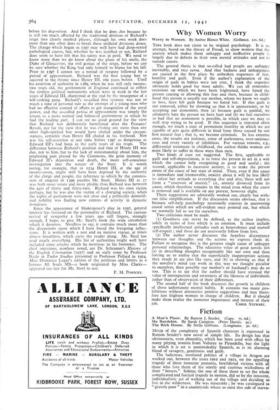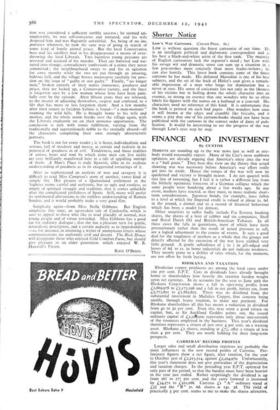Fiction
MUCH of the complexity of Spanish character is expressed in Ramon Sender's new novel of simple life. Its design has that obviousness, even absurdity, which has been used with effect by many pitying ironists from Voltaire to Pirandello, but the light in which it is set is unmistakably Spanish, as is its alarming blend of savagery, gentleness and guile.
The ludicrous, involuted politics of a village in Aragon are worked out, between the years 1910 and 1925, on the appalling tragedy of three innocent peasants, bewildered victims with all those who love them of the stately and cautious wickedness of their " betters." Sabino, the one of these three to set the whole complicated and farcical tragedy in motion, did so by the innocent, individualistic act of walking out of the village and deciding to live in the wilderness. He was miserable ; he was catalogued as " gravely poor " in a countryside where to exist this side of starva- tion was considered a sufficient earthly success ; he seemed un- employable, he was self-conscious and tortured, and his wife despised him and was flagrantly unfaithful. So, being of no im- portance whatever, he took the sane way of going in search of some kind of lonely animal peace. But the local Conservative boss and his satellites find in his disappearance a means of over- throwing the local Liberals. Two harmless young peasants are arrested and accused of his murder. They are battered and tor- tured into strange, contradictory confessions of a crime they never committed ; the neighbourhood sways to and fro in agitation for some months while the two are put through an amazing, hideous hell, and the village bosses manoeuvre carefully for posi- tion on the issue of " guilty or not guilty." Finally, " no longer men," broken entirely of their native innocence, goodness and peace, they are locked up, a Conservative victory, and the farce is forgotten save by a few women whose lives have been pain- fully rent by the episode. After fifteen years they are released, to the misery of adjusting themselves, suspect and confused, to a life that has more or less forgotten them. And a few months after their return to freedom Sabino is found—" a man-monster " roaming the wild hills. He is brought home to his wife and mother, and the whole storm breaks over the village again, with the Liberals exultantly set on their immense opportunity. The conclusion is rich with ironic fulfilment, varying from the traditionally and superstitiously noble to the eternally absurd—all the characters completing their own strongly idiosyncratic portraits.
The book is not for every reader ; it is fierce, individualistic and serious, full of mockery and mercy, as certain and realistic in its portrayal of goodness as of evil. Tenderness, and those realities of senses, heart and soul by which alone men can live richly are very brilliantly manifested here in a tale of appalling outrage of them. A Man's Place is truly Spanish, alike in its realistic understanding of goodness as in its exaggerated torturings of it.
After so sophisticated an analysis of woe and savagery it is difficult to read Miss Campion's story of another, rawer kind of simple life. Her picture of a Queensland settlement in the 'eighties seems careful and authentic, but so ugly and rootless, so empty of spiritual struggle and tradition, that it comes unluckily after the complicated pitifulness of Spain. Still, many will prefer its sentimental alleviations to the ruthless understanding of Ramon Sender; and it would probably make a very good film.
• Simplicity again—from Miss Stella Gibbons. But English simplicity this time; an up-to-date tale of Cinderella, which is sure to appeal to those who like to read placidly of normal, nice young people and of virtue rewarded. Miss Gibbons has a good ear for ordinary dialogue ; also she has a pleasant turn for gentle, naturalistic description, and a certain audacity as to improbabilites —as, for instance, in inventing a writer of anonymous letters whose communications are uniformly civil and decent. The Rich House will disappoint those who enjoyed Cold Comfort Farm, but should give pleasure to an older generation which enjoyed W. B. Maxwell's Vivien.
KATE O'BRIEN.



























 Previous page
Previous page